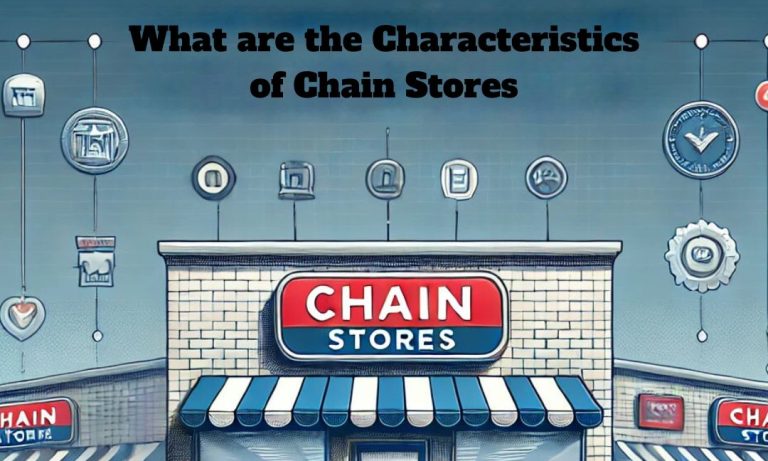Chain stores are retail outlets owned and operated by the same company, offering similar products or services across multiple locations. These stores operate under a unified management system, maintain standardized procedures, and often target a broad customer base. By leveraging centralized control and economies of scale, chain stores ensure consistent customer experiences and cost efficiency. Common examples include major brands in grocery, clothing, and fast food industries. Knowing what these characteristics are will help understand how they affect the retail market.
What is a Chain Store?
A chain store is a type of retail business which operates under the same brand name and ownership through various outlets. These stores are strategically located to cover as wide a customer base as possible and are managed centrally to maintain uniformity in products, services, and branding. The concept of chain stores has revolutionized the retail industry by allowing businesses to expand their reach, standardize customer experiences, and achieve cost efficiencies through bulk purchasing and centralized operations.
Key Features of Chain Stores
- Centralized Management: Decisions about products, pricing, marketing, and operations are made at the corporate level, ensuring consistency across all locations.
- Uniform Branding: All outlets share the same brand identity, logo, and store design, creating a familiar experience for customers.
- Bulk Purchasing: Chain stores buy inventory in large quantities, reducing costs and increasing profit margins.
- Wide Reach: With multiple locations, chain stores target diverse geographic markets and customer demographics.
Examples of Chain Stores:
- Grocery Stores: Walmart, Tesco, Carrefour.
- Clothing Stores: H&M, Zara, Gap.
- Fast Food Chains: McDonald’s, Subway, KFC.
The success of chain stores lies in their ability to maintain consistency while catering to a broad audience.
What are the Characteristics of Chain Stores?
Chain stores are considered entities with several distinct characteristics, distinguishing them from other types of retail operations. These are key characteristics that define their success and efficiency in the competitive retail market.
Centralized Control
- All decision-making processes, including procurement, pricing, and marketing, are handled by the central management.
- This centralization ensures uniformity across all locations, reducing operational inefficiencies.
Standardized Products and Services
- Chain stores offer the same range of products and services in all their outlets.
- Standardization ensures that customers receive a consistent experience regardless of the store location.
Economies of Scale
- Chain stores benefit from bulk purchasing, which reduces costs per unit and increases profit margins.
- Centralized logistics and distribution systems further reduce costs.
Uniform Branding and Store Layout
- All chain stores share the same branding, logo, signage, and store design.
- This uniformity builds brand recognition and trust among customers.
Wide Geographical Presence
- Chain stores operate in multiple locations, often nationally or globally.
- This widespread presence allows them to reach a larger customer base and increase market penetration.
Customer Loyalty Programs
- Many chain stores implement loyalty programs to encourage repeat business.
- Examples include reward points, membership discounts, and exclusive offers.
Technological Integration
- Chain stores often use advanced technology for inventory management, customer analytics, and sales tracking.
- Online ordering and delivery services are common extensions of their operations.
Cost Efficiency
- By centralizing operations and streamlining processes, chain stores achieve higher cost efficiency than independent retailers.
Table: Characteristics of Chain Stores
These characteristics are the backbone of chain stores, enabling them to maintain consistency, grow their customer base, and operate efficiently.
| Characteristic | Description |
| Centralized Control | Uniform decisions for all locations. |
| Standardized Products | Same products and services across all outlets. |
| Economies of Scale | Bulk purchasing reduces costs. |
| Uniform Branding | Consistent branding and store design. |
| Wide Geographical Reach | Locations in multiple regions or countries. |
| Customer Loyalty Programs | Programs to encourage repeat purchases. |
| Technological Integration | Advanced tools for inventory, analytics, and online sales. |
Limitations of Chain Stores as a Business Strategy
While chain stores offer several advantages, they also face notable limitations and challenges. Such limitations can affect their operations and profitability and adaptability in a changing market.
High Initial Investment
- Establishing and managing multiple outlets require significant capital for real estate, inventory, and staffing.
- The cost of maintaining uniformity across locations adds to the financial burden.
Limited Flexibility
- Centralized decision-making often reduces the flexibility to adapt to local market preferences.
- Chain stores may struggle to cater to regional or cultural differences effectively.
Dependency on Supply Chain
- Chain stores rely heavily on efficient supply chains to ensure uniform product availability.
- Disruptions in the supply chain can lead to stockouts or increased costs.
Intense Competition
- Chain stores face stiff competition from online retailers, local businesses, and other chain stores.
- Maintaining customer loyalty requires constant innovation and competitive pricing.
Operational Complexity
- Managing multiple locations increases the complexity of operations, requiring sophisticated systems and trained personnel.
- Issues such as employee turnover and inconsistent service quality can arise.
Environmental and Ethical Concerns
- Chain stores are often criticized for their environmental impact, such as high energy consumption and waste production.
- Ethical concerns, such as low wages or exploitation of suppliers, can damage their reputation.
Mitigation Strategies
- Invest in local market research to tailor products and services to regional preferences.
- Diversify supply chains to reduce dependency on a single source.
- Embrace sustainable practices to address environmental and ethical concerns.
Despite their limitations, chain stores remain a dominant force in the retail industry due to their ability to innovate and adapt.
Conclusion
Chain stores are characterized by centralized management, standardized products, economies of scale, and uniform branding. These characteristics allow them to have uniformity, lower their costs, and expand their businesses to various locations. But the chain store has some drawbacks, including high operating costs, dependence on the supply chain, and competitive pressures, that make them less successful. The chain store model can be utilized for business growth and profitability if one understands its strengths and weaknesses.
What are the Characteristics of Chain Stores ? FAQs
What is a Chain Store?
A chain store is a retail business operating multiple outlets under the same brand, with centralized management and standardized operations.
What are the Characteristics of Chain Stores?
Chain stores are defined by features like centralized control, uniform branding, standardized products, economies of scale, and a wide geographical presence.
What are the benefits of chain stores?
Benefits include cost efficiency, consistent customer experiences, brand recognition, and extensive market reach.
What are the limitations of chain stores?
Limitations include high initial investment, reduced flexibility, supply chain dependencies, and intense competition.
How do chain stores achieve economies of scale?
Chain stores achieve economies of scale through bulk purchasing, centralized logistics, and streamlined operations, reducing per-unit costs and increasing profitability.


